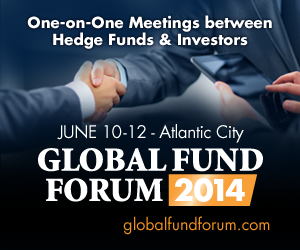 Opalesque Exclusive: For hedge funds, longer due diligence periods can mean marketing through up and down performance cycles
Opalesque Exclusive: For hedge funds, longer due diligence periods can mean marketing through up and down performance cycles
From Kirsten Bischoff, Opalesque New York: As the asset raising environment begins to ease, investors that are evaluating hedge fund managers for allocations have begun to place a much higher value on the quality of a manager’s business acumen. “In terms of investors’ willingness to start looking at hedge funds again, post Madoff and post financial crisis, it seems as though asset raising opportunities for managers are re‐opening. However, investors are digging deeper and identifying new ways to perform due diligence,” says Lisa Vioni, CEO and Founder of marketing platform Hedge Connection.
While assets have begun to flow back into the industry, the due diligence process is longer than it was prior to the financial crisis. Vioni believes this development can be attributed to investors’ determination to evaluate how well a manager runs the business side of the hedge fund, in addition to analyzing fund performance.
The due diligence focus has led many funds to make changes such as incorporating third party administrators into their operations, even at what is sometimes significant expense (for smaller funds especially), because investors have made it clear that by and large they will not invest in managers who do not use third party administrators. Best practices such as these are being implemented across the board in areas such as operations and investor relations and are a fund’s best chance of securing allocations because they strengthen the foundation of the firm’s business.
“One thing that I see consistently is that many fund managers know how to trade a certain sector but do not understand how to run a business. If you do not know how to run a business, then it will start to unravel pretty quickly, and I think that is why you see funds that do go out of business typically do so in the first one to three years. In addition, the manager has to perform well and be able to communicate clearly their expertise to investors. If they accomplish all of these objectives, the fund manager may make it to the point where investors believe it is a good idea to make an allocation,” says Vioni.
However, one drawback to the longer investment process is that fund managers have to deliver strong performance throughout a longer period of intense evaluation. As we saw in March, with the effects of the Japan earthquake and tsunami on the financial markets – this is not always realistic. And it is especially stressful on hedge funds, which are typically evaluated for performance on a month‐to‐month basis. This means that one of the most imperative things for managers to understand is that when there are performance hiccups, managers need to maintain a high level of transparency with current and potential investors, even though that is not usually their gut reaction.
“As a hedge fund manager, you presumably have specialized trading expertise and market insights. You must be willing and able to communicate your ideas and vision to potential investors on a daily basis through various market conditions. The more effectively a manager can communicate their investment strategy, process and sources of returns, the faster they will establish trust and the more successful they will be at raising money,” says Vioni.
Hedge Connection recently announced an agreement with Morningstar that will allow the firm’s clients to license their Morningstar ratings and then use those ratings to market their fund to investors. Vioni says that she sees the relationship as benefitting her clients in multiple ways, by allowing them to harness the power of aligning themselves with an established brand and by taking an additional step to set themselves apart from other managers competing within their space.
Morningstar ratings require 38 continuous months of returns reporting, and they rate funds against their peers within the following strategies: equity, debt, event, arbitrage, global, and multi strategy. The company currently manages information on over $1.2T assets, which represents over 10,000 active funds. Of these funds 3,400 are rated (which means they meet the 38 month track record requirement for this analysis). For many investors that are looking for hedge fund investments, Morningstar rating system offers a sound first‐screen because post‐financial crisis many investors will not allocate to funds with less than a three‐year track record.
The institutionalization of the industry means that ratings and rankings such as those provided by Morningstar are typically researched already by investors. As Liz Kirscher, President of Morningstar’s Data Division says, “Morningstar has a reputation for putting investors first. Our ratings and rankings are a great way for hedge funds to differentiate themselves and for investors to be better able to compare and evaluate funds.”
Vioni points out that fund managers typically want to “wait on marketing” until their performance is at its best, or until their two or three star rating from Morningstar is a four star rating. But from a marketing perspective she says for fund managers, increasing transparency through consistent communication in both good and bad times actually gives them more control in managing the interpretation of that information by investors.
Addressing both strong and poor performance in the same manner, and explaining to investors the reasoning behind certain strategies means that in most cases, investors will hold off on judgment until they have spoken with a manager – because they value the relationship they have with that manager.
It is a struggle that Opalesque has heard many marketing professionals speak about when discussing hedge fund managers and asset raising. And the continued focus on monthly reporting numbers does little to help managers realize that establishing relationships often requires them to market through both up and down performance.
“Marketing a hedge fund is challenging. There are several rules that a fund must consider so that they do not break Regulation D. It is also important to differentiate your fund from your competitors. Using the Morningstar rating can help funds differentiate their offerings. It is not the final step of the investment sourcing process, but it certainly can be an important first,” says Vioni.




Leave a Reply